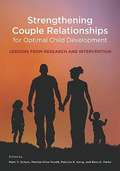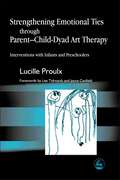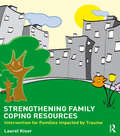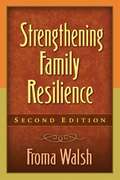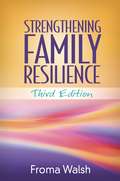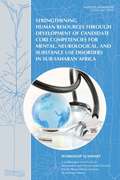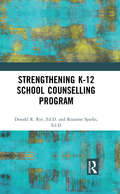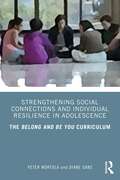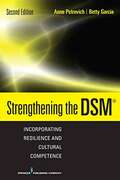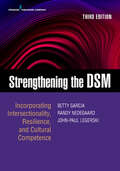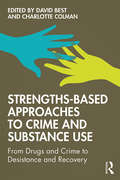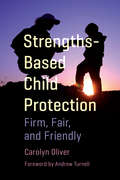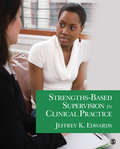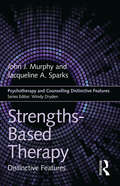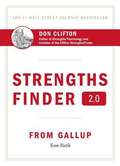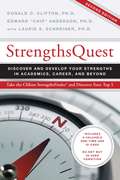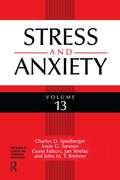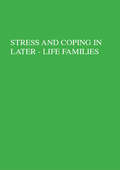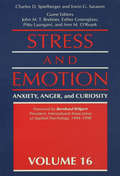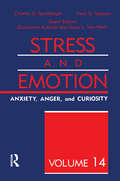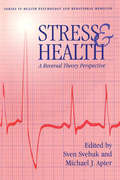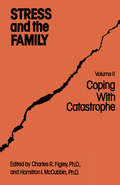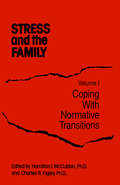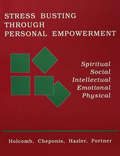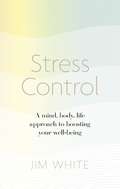- Table View
- List View
Strengthening Couple Relationships for Optimal Child Development: Lessons From Research And Intervention
by Marc S. SchulzThis volume bears witness to two important transitions. First, it emphasizes the dynamic importance of family transitions, particularly for the growth and development of relationships and each of their component individuals. It captures the processes by which the components of this complex social system change during the course of the transition and how changes in one component are linked to changes in the others. Second, and more broadly, this volume captures a critical transition in the larger research community. The contributors display a clear and equal partnership between intervention researchers and longitudinal observers of family systems that has developed over the past few decades. We understand, as family transitions unfold, that intervention is a critical strategy for understanding the links among family systems observed over time. We also understand that the outcomes of interventions are best followed as further development of the family system, not just successes or failures. Thus, intervention studies are enhanced by understanding the intervention as a major developmental transition, often superimposed on other family transitions.
Strengthening Emotional Ties through Parent-Child-Dyad Art Therapy: Interventions with Infants and Preschoolers
by Lucille ProulxParent-child-dyad art therapy is an interesting and innovative art therapy, in which parent and child share the production of an artwork. Aiming to reinforce or re-establish bonds between children and parents, it provides a space where parents' early unresolved conflicts and children's developmental abilities can be expressed. Lucille Proulx explores many aspects of dyad art therapy including attachment relationship theories, the roles of parents and art therapists in dyad interventions, the importance of the tactile experience and ways in which dyad art therapy could be used to treat other age groups. This original book, with illustrations of parent-child artwork, will be invaluable to mental health professionals in prevention and early childhood fields and also to any parents wishing to enrich their interactions with their children.
Strengthening Family Coping Resources: Intervention for Families Impacted by Trauma
by Laurel KiserStrengthening Family Coping Resources (SFCR) uses a skill-building, multi-family group framework to teach constructive resources to families who have a high exposure to stress and trauma. As an intervention for high-risk families, SFCR can cause a reduction in symptoms of traumatic distress and behavior problems and help families demonstrate higher functioning. The SFCR manual is based on a systemic, family approach and uses empirically-supported trauma treatment that focuses on family ritual, storytelling, and narration, which improves communication and understanding within family members. The manual is organized into three accessible parts:• Part 1 details the theoretical and empirical foundations of SFCR• Part 2 focuses on implementation and the clinical guidelines for conducting SFCR• Part 3 contains session guidelines focused on the multi-family group versions of SFCREach session included in the intervention is structured according to specific guidelines, and instructions provide examples of what facilitators might say to a group. Formed through the input of psychiatrists, psychologists, social workers, and anthropologists, Strengthening Family Coping Resources will help you reduce the symptoms of traumatic stress disorders and increase coping resources in children, adult caregivers, and the family system. It also provides a novel approach to addressing co-occurring traumatic reactions in multiple family members by including developmentally appropriate skill-building activities that are reinforced with family practice. For anyone working with families in a therapeutic capacity, this manual is a must-have resource.
Strengthening Family Resilience, Second Edition
by Froma Walsh Susan McdanielThis informative clinical resource and text presents Froma Walsh's family resilience framework for intervention and prevention with clients dealing with adversity. Drawing on extensive research and clinical experience, the author describes key processes in resilience for practitioners to target and facilitate. Useful guidelines and case illustrations address a wide range of challenges sudden crisis, trauma, and loss; disruptive transitions, such as job loss, divorce, and migration; persistent multistress conditions of serious illness or poverty; and barriers to success for at-risk youth. New to This Edition Reflects the latest research and practice advances. Chapter on resilience-oriented approaches to recovery from major disasters. Chapter on applications in community-based programs and international contexts.
Strengthening Family Resilience, Third Edition
by Froma WalshIn this widely used course text and practitioner resource, Froma Walsh provides a state-of-the-art framework for understanding resilience in families and how to foster it. Illuminating the complex interplay of biopsychosocial influences in risk and resilience, she identifies key transactional processes that enable struggling families to grow stronger and more resourceful. Case illustrations demonstrate Walsh's collaborative approach with diverse families facing a wide range of crisis situations and chronic multistress challenges. The book features practice principles, tools, and guidelines, as well as programmatic applications. New to This Edition *Incorporates the latest practice advances and resilience research. *Chapter on assessment tools and strategies. *Chapter on disruptive transitions across the family life cycle. *Expanded coverage of war-related and collective trauma.
Strengthening Human Resources Through Development of Candidate Core Competencies for Mental, Neurological, and Substance Use Disorders in Sub-Saharan Africa
by Institute of Medicine Theresa M. Wizemann Bruce M. Altevogt Board on Health Sciences Policy Diana E. Pankevich Patricia A. Cuff A Collaboration of the Forum on Neuroscience and Nervous System Disorders and the African Science Academy Development InitiativeOne of the largest treatment gaps for mental, neurological, and substance use (MNS) disorders in the world can be seen in Sub-Saharan Africa (SSA). According to the World Health Organization (WHO), about 80% of people with serious MNS disorders living in low- and middle-income countries do not receive needed health services. A critical barrier to bridge this treatment gap is the ability to provide adequate human resources for the delivery of essential interventions for MNS disorders. An international workshop was convened in 2009, by the .S. Institute of Medicine (IOM) Forum on Neuroscience and Nervous Systems Disorders and the Uganda National Academy of Sciences (UNAS) Forum on Health and Nutrition, to bring together stakeholders from across SSA and to foster discussions about improving care for people suffering from MNS disorders and what steps, with potential for the greatest impact, might be considered to bridge the treatment gap. Due to the broad interest to further examine the treatment gap, the IOM forum organized a second workshop in Kampala, Uganda on September 4 and 5, 2012. The workshop\'s purpose was to discuss candidate core competencies that providers might need to help ensure the effective delivery of services for MNS disorders. The workshop focused specifically on depression, psychosis, epilepsy, and alcohol use disorders. Strengthening Human Resources Through Development of Candidate Core Competencies for Mental, Neurological, and Substance Use Disorders in Sub-Saharan Africa: Workshop Summary outlines the presentations and discussions by expert panelists and participants of the plenary sessions of the workshop. This summary includes an overview of challenges faced by MNS providers in the SSA, perspectives on the next steps, the 2009 workshop, and more.
Strengthening K-12 School Counselling Programs: A Support System Approach
by Donald R. Rye Rozanne SparksStrengthening K-12 School Counseling Programs aims to help school counselors, counselors in training, school administrators, and other members of the school community develop and strengthen developmental school counseling programs. Providing a step-by-step approach to planning and managing a comprehensive developmental counseling program, this book encourages school and community-based counseling teams coordinate their efforts to design coherent, complementary programs rather than competing, fragmented ones.This second edition is significantly expanded, including additional information on preparing the advisory team and building a foundation of core beliefs and governing values. Also included is an example of a Counseling Program Activity Guide, as well as a chapter devoted to examples from the field from school systems in Arkansas, Missouri, Kansas and Tokyo, Japan.
Strengthening Social Connections and Individual Resilience in Adolescence: The Belong and Be You Curriculum
by Peter Mortola Diane GansThis book introduces a group counseling curriculum that provides both a foundation to confidently lead a counseling group for adolescents and inspiration for how a group leader can adapt and modify the text in a range of settings. The curriculum is three-fold, corresponding with the three major sections of the text. In Part One of the text, the authors provide a conceptual and practical way of understanding two matters: first, the critical leadership challenges faced by group counselors as well as the skills they need to navigate those challenges successfully, and second, the critical developmental challenges faced by adolescents and the skills they need to navigate those challenges successfully. Part Two introduces a nine-week social skills curriculum – Belong and Be You – designed and modified over ten years of use to help adolescents be better socially connected as well as confidently independent. Part Three provides an additional resource which is meant to be used in tandem with the curriculum: 40 strategic stories on four different themes contributed by faculty and students. This book will benefit school counselors and group counselors working with adolescents to successfully navigate group leadership and help students embrace themselves and find belonging.
Strengthening The Dsm: Incorporating Resilience And Cultural Competence
by Anne Petrovich Betty GarciaMental health practitioners have long recognized the failure of the DSM to address important sources of strength and resiliency that can significantly affect diagnosis and treatment, a deficit that has become more pronounced with the DSM-5’s elimination of the multiaxial format. The second edition of Strengthening the DSM® presents a new conceptual framework—the Diversity/Resiliency Formulation— that encompasses the whole person in order to promote effective diagnosis and treatment. It considers patient strengths, sources of resilience, support, and cultural identity that are essential to the accurate understanding of an individual, and demonstrates how mental health practitioners can draw upon these resources during treatment. The second edition also addresses significant changes resulting from implementation of the Affordable Care Act (ACA) and features a completely new chapter on trauma and stressor-related disorders.
Strengthening the DSM®: Incorporating Intersectionality, Resilience, and Cultural Competence
by Betty Garcia Randy Nedegaard John-Paul LegerskiThis essential companion to the DSM uniquely integrates intersectionality and resilience that helps mental health practitioners assess clients from a strength-based perspective. The third edition expands the section on neurocognitive disorders to include traumatic brain injury, includes more information on assessment and treatment of common childhood disorders, and brings a new focus on the impact of today’s culture wars and their impact on mental health professionals, policy, and clients Also new to the third edition is an emphasis on meta-analysis literature and a module on wellbeing discussing neuroscience and wellness concepts in relation to a strengths-based approach to diagnosis. By demonstrating how to practically integrate diversity and intersectionality into the diagnostic process rather than limiting assessment to a purely problem-focused diagnostic label, this successful textbook strengthens the DSM for social workers and other mental health practitioners by promoting the inclusion of intersectionality, resiliency, culture, spirituality, and community into practice. It includes multiple case studies featuring complex, real life scenarios that offer a greater depth of learning by demonstrating how a strength-based assessment of the whole person can lead to more effective and successful treatment. Discussion questions promote critical thinking, key points in each chapter highlight and reinforce important concepts, and abundant web resources encourage additional study. The book also includes a robust instructor package. Purchase of the print edition includes access to Ebook format. New to the Third Edition: Adds traumatic brain injury to neurocognitive disorders section Expands information on treatment of common childhood disorders Emphasizes meta-analysis literature Discusses neuroscience and wellness concepts in relation to a strengths-based approach to diagnosis Focuses on wellness and health care delivery in the context of today’s culture wars Key Features: Delivers a unique formulation integrating intersectionality and resilience to provide strengths-based assessment and treatment Demonstrates the rationale for strengths-based DSM practice Includes real-life case scenarios for complex problem-solving Uses a standard format for each disorder for quick access to information Reviews key literature on disorders and evidence-based best practices Provides classroom questions and activities to foster critical thinking Identifies professional and scholarly activities to promote increased effectiveness in diagnosis
Strengths-Based Approaches to Crime and Substance Use: From Drugs and Crime to Desistance and Recovery
by David Best Charlotte ColmanAlthough there is a strong and growing literature in the two areas of desistance and addiction recovery, they have developed along parallel pathways with little systematic assessment of the empirical evidence about the co-occurrence of the relationship or how one area can learn from the other. This book aims to fill that gap by bringing together emerging literature on the relationship between offending and substance use. Instead of focusing on the active period of its onset and persistence, this book examines the mechanisms that support desistance, addiction recovery, and the common themes of reintegration and rehabilitation. With contributions from a wide range of international experts in the fields of desistance and addiction recovery, the book focuses on a strengths-based, relational and community-focused approach to long-term change in offending and drug-using populations, as well as the shared barriers to effective reintegration for both. This book will be highly informative for a wide audience, from academics and students interested in studying desistance and recovery to those working in addiction services and the criminal justice system as well as policy makers and the people undertaking their own journeys to desistance and recovery.
Strengths-Based Child Protection: Firm, Fair, and Friendly
by Carolyn OliverStrengths-based, solution-focused practice is one of the most exciting areas of contemporary child protection work. The demand for this protection practice has increased faster than the availability of training resources to help students and practitioners, until now. Strengths-Based Child Protection is the first textbook solely dedicated to furthering strengths-based practices in a child protection setting. Carolyn Oliver provides an original, accessible, and practical research-based model that focuses on the key to success in this field: the worker-client relationship. Oliver’s long and varied front line experience in child welfare and research based on surveys and interviews with 225 child protection workers provides grounding in the realities of child protection work. Strengths-Based Child Protection contains a rich combination of case studies, reflective questions, and exercises that enable students and practitioners to conceptualize and master implementing strengths-based practices with children.
Strengths-Based Supervision in Clinical Practice
by Jeffrey K EdwardsMoving away from the usual medical-modeled framework of mental health focused on problems, Strengths-Based Supervision in Clinical Practice by Jeffrey K. Edwards takes a postmodern, social construction approach, looking for and amplifying strengths and encouraging stakeholders to use them. Based on research in brain science, as well as from the Information Age/Connectivity Age thinking, the book reframes the focus of supervision, management, and leadership to one that collaborates and builds on strengths with supervisees as competent stakeholders in their work with their clients.
Strengths-based Therapy: Distinctive Features (Psychotherapy and Counselling Distinctive Features)
by John J Murphy Jacqueline A SparksStrengths-Based Therapy: Distinctive Features offers an introduction to what is distinctive about this innovative client-directed approach. Written by two experienced practitioners of strengths-based therapies, this book translates SBT principles and practices into concise, evidence-based ideas and techniques that mental health practitioners can immediately apply on the job. Using the popular Distinctive Features format, this book describes 15 theoretical features and 15 practical techniques of Strengths-Based Therapy. Strengths-Based Therapy will be a valuable resource for psychotherapists, clinical, health and counselling psychologists, counsellors, psychiatrists, marriage and family therapists, social workers, and all who wish to know more about this unique approach to therapy.
StrengthsFinder 2.0
by Tom RathThis book helps readers discover their distinct talents and strengths and how they can be translated into personal and career successes.
Strengthsquest: Discover and Develop Your Strengths in Academics, Career, and Beyond
by Donald O. Clifton Laurie A. Schreiner Edward AndersonThis book and the strengths approach to achieving in academics, career, and beyond represent a revolutionary departure from traditional and counterproductive philosophies and practices. We hope that its principles resonate with you, and that you apply the strengths approach to achieving success in all of your life's endeavors!
Stress And Anxiety: Anxiety, Anger And Curiosity, Volume 17 (Clinical and Community Psychology)
by Irwin G. Sarason Charles D. Spielberger John M. T. Brebner Jan StrelauThis Volume Is Concerned With Emotional Reactions To Stress And Is organized in five parts dealing with stress and emotion theory; stress Conflict And Personality; Emotional Reactions To Stress; Physiological reactions to stress; and the relationship of type-A behaviour to heart disease.
Stress And Coping In Later-Life Families (Applied Psychology: Social Issues and Questions)
by Janis H. Crowther Daniel L. Tennenbaum Stevan E. Hobfoll Mary A. StephensA product of the Kent Psychology Forum 1989, the book focuses on how older adults and their families cope with the vicissitudes of later life.
Stress And Emotion: Anxiety, Anger, & Curiosity (Stress And Emotion Ser. #Vol. 15)
by Irwin G. Sarason Pittu Laungani Charles D. Spielberger John M. T. Brebner Esther Greenglass Ann M. O’Roark"First Published in 1996, Routledge is an imprint of Taylor & Francis, an informa company."
Stress And Emotion: Anxiety, Anger, And Curiosity (Series in Stress and Emotion: Anxiety, Anger, and Curiosity #Vol. 15)
by Irwin G. Sarason Charles D. Spielberger Zsuzsanna Kulcsár Guus L. Van HeckThis volume, based on an international conference on current research in Stress And Emotion, Covers, In Four Sections, Theoretical Aspects, perception, cognition and emotion, the physiological and biological Concomitants Of Emotion And Type A Behaviour And Emotion.
Stress And Health: A Reversal Theory Perspective (Health Psychology and Behavioral Medicine Series)
by Michael J. Apter Sven SvebekFirst published in 1997. Routledge is an imprint of Taylor & Francis, an informa company.
Stress And The Family: Coping With Catastrophe (Psychosocial Stress Series #No. 2)
by Charles R. Figley Hamilton I. McCubbinFirst Published in 1983. Routledge is an imprint of Taylor & Francis, an informa company.
Stress And The Family: Coping With Normative Transitions (Psychosocial Stress Series #No. 2)
by Hamilton I. McCubbin & Charles R. FigleyFirst published in 1983. Routledge is an imprint of Taylor & Francis, an informa company.
Stress Busting Through Personal Empowerment
by Thomas F. Holcomb George John Cheponis Richard J. Hazler Eileen McPhillips PortnerExcessive stress has become one of the world's leading health hazards, taking its toll on loved ones, friends and co-workers. Through books, magazines and newspaper articles, people are constantly exposed to the problem - but are not shown how to affect their own personal solution. Hard work, commitment and personalisation of problem areas are the keys to successful stress busting. Showing how to do the necessary work in a personalised format, this workbook provides varied exercises to help reach the goal of mastering stress. The authors feel that every individual can develop Personal Empowerment Skills - basic talents, abilities, and coping strategies that everyone has at their personal disposal - once they realise they are responsible and in control of their lives.
Stress Control: A Mind, Body, Life Approach to Boosting Your Well-being
by Jim WhiteStress is part and parcel of life. We all get it. Think of blood pressure. If you are alive, you have blood pressure. If you are alive, you have stress. If your blood pressure gets too high, you should do something about it. The same is true with stress and this book will help you to control it.Stress can be a mixture of anxiety, depression, panic feelings, poor sleep, low self-confidence, low self-esteem and a poor sense of wellbeing. It is one of the most common problems in the world today. But controlling your stress doesn't have to mean expensive therapy or a long waiting list for a referral to a service. This book will teach you to become your own therapist:· Learn about stress and how it affects you· Follow straight-forward steps to get an instant sense of control· Develop a set of linked skills for long-term stress management· Boost your wellbeing· Feel in control of your futureThis accessible, jargon-free book combines clinically proven methods from cognitive behavioural therapy (CBT), positive psychology and mindfulness to give you the tools you need to improve your mind, your body and your life.
